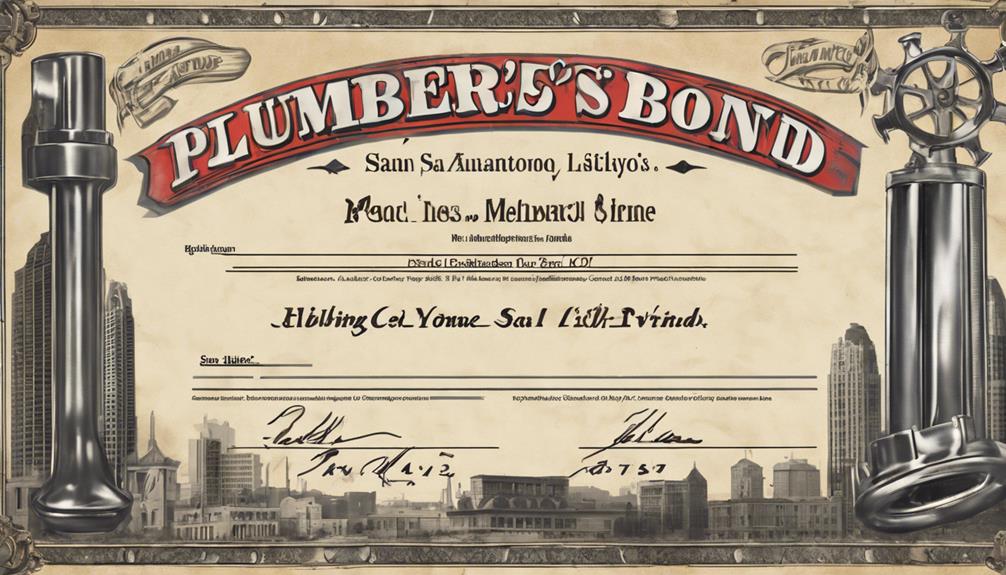If you're a plumber in San Antonio, understanding the nuances of obtaining a plumber bond is vital for your business. This bond not only safeguards your clients but also solidifies your standing in a competitive marketplace. You'll want to be aware of the specific requirements and potential pitfalls associated with non-compliance. As you consider your options, think about how these factors can impact your operations. What happens if you overlook this crucial step? The answers might surprise you.
What Is a Plumber Bond?

A plumber bond is a crucial financial safeguard that protects both clients and contractors in the plumbing industry. Essentially, it's a legally binding agreement between you, the contractor, and a bonding company. When you obtain a plumber bond, you're ensuring that you'll adhere to local laws and regulations while providing your services.
This is particularly important as many states, including Illinois, have specific regulations regarding Illinois Surety Bonds that ensure compliance and protect against financial loss. If you fail to meet these obligations, the bond acts as a safety net for your clients.
This bond guarantees that, in case of any issues—like incomplete work, damages, or violations of code—clients can seek compensation. The bonding company steps in to cover the financial loss up to a specific limit. It's a way to build trust with your clients, showing them you're committed to high standards.
In addition to protecting clients, a plumber bond can also enhance your reputation. It signals to potential customers that you take your work seriously and are financially responsible. Many clients won't even consider hiring a plumber without this bond, as it provides them peace of mind.
Importance of Plumber Bonds
Understanding the importance of plumber bonds is essential for anyone in the plumbing industry. These bonds serve as a safety net for both clients and plumbing professionals. When you obtain a plumber bond, you're demonstrating your commitment to adhering to local regulations and industry standards, which helps build trust with your clients.
In Texas, for instance, the City of San Antonio requires a specific bond amount of $5,000 for plumbers, ensuring a level of accountability in the industry Texas Plumber Bond Requirements.
Plumber bonds protect consumers from potential financial loss due to subpar work or unethical practices. If a plumber fails to meet their obligations, clients can file a claim against the bond to recover damages. This reassurance can make a significant difference when homeowners are choosing a plumber, as they'll feel more secure knowing that there's a financial safeguard in place.
Additionally, having a plumber bond enhances your credibility. It signals to potential clients that you're serious about your profession and willing to take the necessary steps to comply with legal requirements.
In a competitive market, this can set you apart from others who may not have secured bonding.
Requirements in San Antonio

When operating as a plumber in San Antonio, it's important to know the specific bonding requirements that ensure compliance with local regulations. You'll need to obtain a plumber bond to legally perform plumbing work in the city. This bond acts as a financial guarantee that you'll adhere to the laws governing plumbing practices and fulfill your obligations to clients.
To streamline the bonding process, consider working with a bonding company that specializes in surety bond services, as they can assist in navigating the requirements efficiently.
To get started, you'll need to choose a bonding company that's licensed to operate in Texas. They'll assess your qualifications and determine the bond amount based on your experience and the scope of your work. Typically, the bond will cover a range of financial liabilities, including potential damages or breaches of contract.
You'll also have to provide proof of your plumbing license, insurance, and any other documentation required by the city. Once you've secured the bond, it's crucial to keep it active and renewed as needed to avoid any disruptions in your ability to work.
Keep in mind that failing to meet these requirements could lead to fines or even the loss of your license. Staying informed and compliant will help you build a successful plumbing business in San Antonio.
Types of Plumber Bonds
Plumber bonds come in various types, each serving a distinct purpose in ensuring compliance and protecting clients. The most common type is the license bond, which guarantees that you'll adhere to state regulations and local codes. This bond protects your clients by ensuring you're qualified to perform plumbing work and that you'll follow all necessary guidelines.
Another type is the performance bond, which assures clients that you'll complete the work as promised. If you fail to fulfill your contractual obligations, the bond can cover the costs for the client to hire another plumber. This type of bond builds trust and can make you more competitive in the market.
Then there's the payment bond, which ensures that you'll pay your subcontractors and suppliers. This bond protects those involved in your projects, helping to prevent liens on properties due to unpaid bills.
Lastly, fidelity bonds protect against employee dishonesty, covering losses from theft or fraud committed by your staff.
Understanding these different types of plumber bonds helps you choose the right coverage for your business, ensuring you're compliant and your clients are protected.
How to Obtain a Bond

Obtaining a plumber bond in San Antonio, TX, is a straightforward process that involves a few key steps.
First, you'll need to decide on the type of bond you require, such as a license bond or a performance bond, depending on your specific needs.
Next, gather the necessary documentation, which typically includes proof of your plumbing license, identification, and any required insurance certificates.
Once you have your documents ready, it's time to approach a surety bond provider. You can choose to work with an insurance agent or a specialized bonding company. They'll guide you through the application process and help you understand the requirements.
Be prepared to provide additional information about your business, including its financial history and experience in the plumbing industry.
After submitting your application, the surety company will review it and assess your qualifications. If approved, you'll receive a bond agreement that outlines the terms.
Costs Associated With Bonds
The costs associated with bonds in San Antonio, TX, can vary significantly based on several factors.
First, the type of bond you need plays a crucial role. For instance, a general contractor bond might've a different price than a plumber bond. Additionally, the bond amount, which is often set by the state, will affect your costs. Higher bond amounts typically lead to higher premiums.
Next, your credit history can influence the price you pay. If you have good credit, you're likely to secure a lower premium, while poor credit may result in higher costs. Insurance companies assess risk, and your financial history is a key factor in their calculations.
You also need to consider the duration of the bond. Shorter terms might've different pricing compared to longer ones.
Lastly, administrative fees and any additional costs from the bonding company can add to your total expenses.
Renewal and Maintenance

Maintaining your plumber bond in San Antonio, TX, is crucial for staying compliant with state regulations and ensuring your business operates smoothly. To keep your bond in good standing, you'll need to renew it periodically, typically every one to two years. Check your bond's expiration date and set reminders well in advance to avoid any lapses.
During the renewal process, you may need to provide updated documentation, such as proof of insurance or financial statements. It's essential to keep your information accurate and up-to-date to prevent complications. If your financial situation changes or you encounter any issues, inform your bonding company promptly.
Additionally, staying connected with your bonding agent can help you navigate any changes in regulations or requirements. They can provide valuable insights and reminders for maintaining your bond.
Don't forget to review your bond limits and coverage regularly to ensure they meet your business needs. If you expand your services or take on larger projects, you might need to adjust your bond accordingly.
Consequences of Non-Compliance
Failing to comply with plumber bond requirements can lead to serious repercussions for your business in San Antonio, TX. If you neglect to secure or renew your bond, you risk facing hefty fines and penalties from the city. These financial repercussions can strain your budget and impact your ability to operate effectively.
Additionally, non-compliance can result in the suspension or revocation of your plumbing license. Without a valid license, you won't be able to legally perform plumbing work, which can lead to loss of clients and income. Your reputation may also suffer, as clients may choose to work with licensed and compliant plumbers instead.
Moreover, if a claim is filed against your bond due to your negligence, you may be liable for damages, which can be costly. This situation not only affects your finances but can also create legal complications that take time and resources to resolve.
Conclusion
In San Antonio, securing a plumber bond is essential for your business's success and compliance. Not only does it protect your clients and enhance your credibility, but it also keeps you on the right side of the law. By understanding the requirements and types of bonds available, you can easily navigate the process of obtaining one. Don't risk fines or license issues—get your plumber bond today to ensure your operations run smoothly and legally.


